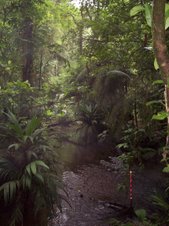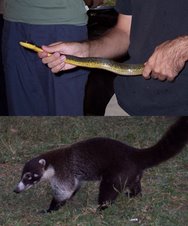There's a heated debate going on in the science education corner of the blogosphere this week over how best to convey scientific knowledge to non-scientists. Matthew Nisbet (a communications prof) and Chris Mooney (a science writer and author of two excellent books on the intersection between science, politics and the media) wrote an article for this week's Science entitled "Science and Society: Framing Science" (you can access the article here ).
They start out with a good point: despite the near-universal acceptance of the existence of phenomena such as global warming and evolution amongst scientists, most Americans - even many college-educated Americans - doubt the veracity of these reports, with viewpoints strongly associated with individual politics. They cite polls showing that while 75% of Democrats agree that global warming is attributable to human activities, only 23% of Republicans accept what is - according to the latest IPCC report - widely considered to be nearly as close to "fact" as is possible to say in science (~97% odds). Similarly, only 27% of Republicans and 42% of Democrats or Independents believe in evolution according to a 2005 Harris poll (I've heard as low as 23% belief across the board in other studies - the lowest level of all developed nations), and a full 45% (!!!) believe that humanity was created by God less than 10,000 years ago (last numbers from this webpage). I read recently (sorry, can't find the citation) that the average American has approximately an 8th-grade level of scientific knowledge (if that). There's no doubt that scientists need to find better and more effective ways to communicate scientific knowledge to the general public, both in school and to adults via the media.
However, there's a hearty debate over how best to go about this. Although in actuality the debate is quite complex, it seems to boil down to this: do we teach science and the scientific method in all it's intricate (though - to many people - boring) details, or do we find a way to "re-frame" science in a way to make it more accessible to non-scientists. Nesbitt and Mooney argue for the latter, going so far as to say: "In short, as unnatural as it might feel, in many cases, scientists should strategically avoid emphasizing the technical details of science when trying to defend it". They stress that rather than emphasizing data - and actually educating people about the scientific method, processes, etc. - we should find ways to "package" information in ways that are "relevant" to people's lives (i.e., speak to the pocketbook).
In the other corner, you have scientists such as P.Z. Myers - a highly-renowned evolutionary scientist and blogger at Pharyngula, and - gasp! - an atheist. He argues, in essence, that we should not "dumb down" science, nor should we have to find a way to repackage and make excuses for evolutionary theory so as not to offend biblical literalists.
Think scientists are just dull, mellow, soft-spoken people locked up in their labs? You should see the jabs going around the blogosphere right now!
Anyway, as for me - well, I'm still waffling. The idealist in me says that we need to improve science education right from the beginning - back in elementary and junior high school. Teach kids the "hows" and the "whys" and find a way to keep it interesting. I don't think we should just toss out the "meat" of science to come up with fluff that will fit within the 30-second soundbite format of modern news. I believe we need to increase scientific knowledge as a whole, so that people can understand the difference between a "theory" and a "hypothesis", can understand why scientists are so reluctant to say something is "absolutely true", and can understand the method behind the results. This is supported by some recent studies (e.g., this paper, which found that in the US - unlike in other developed nations - level of scientific knowledge was the primary factor influencing variation in attitudes towards science.
But yet, I'm aware that many (most?) non-scientists just tune-out discussion of what they consider "boring" details - in this fast-paced information world, they just want the bottom-line. And I think there's a place for the Bill Nye's and the Mythbusters, who make science fun and thus more accessible. We certainly need to improve our skills at writing and speaking to the lay public. But I would caution against going for the soundbite, and softening down your results, at the expense of further diminishing public understanding of science. There has to be a happy medium in there somewhere...
Thursday, April 19, 2007
Thursday, April 12, 2007
Stilla's Sense of Snow
...ok, so it wasn't snow exactly, but as I'm sure you all noticed it was bloody cold last weekend! I woke up Sunday morning - on the Florida coast near Pensacola, mind you - to find ice on the windshield and sleet collected on the cycad plants. Ice - in Florida - in April!!! I tried to find historical weather data for Pensacola to see if I could calculate the probability of temperatures <40 in the first week of April, but couldn't find any free data. I imagine the probability's pretty low, though.
I'm slowly poring through the Bayesian papers and book. It's quite complicated - both theoretically and practically - but we've had a local Bayesian expert, Chuck Bell, speaking to our Phylogenetics class, which has been helpful. He uses Bayesian stats in a different manner (specifically for phylogenetic tree selection, which uses somewhat different techniques and software programs than ecological analysis), but his lectures have been a huge help in understanding the theory behind the techniques (and learning how to read all that Greek code - ok, Latin, but it looks like Greek to me!).
I'm slowly poring through the Bayesian papers and book. It's quite complicated - both theoretically and practically - but we've had a local Bayesian expert, Chuck Bell, speaking to our Phylogenetics class, which has been helpful. He uses Bayesian stats in a different manner (specifically for phylogenetic tree selection, which uses somewhat different techniques and software programs than ecological analysis), but his lectures have been a huge help in understanding the theory behind the techniques (and learning how to read all that Greek code - ok, Latin, but it looks like Greek to me!).
Tuesday, April 3, 2007
On objectivity
I just read a great quote by Stephen Jay Gould - one of my favorite recent (though recently deceased and greatly missed) evolutionary scientists. I practically grew up reading his work - he published monthly columns in Natural History magazine (back when it used to publish semi-technical pieces), and I always admired his abilities for insight, self-reflection, making connections between evolutionary concepts and popular culture references, and in turn explaining complicated theories in terms many laymen could relate to.
Anyway, here's the quote: "The most erroneous stories are those we think we know best - and therefore never scrutinize or question." This was a frequent theme of Gould's (see, e.g., his well-known and oft-cited "Spandrels of San Marcos" paper), and also a frequent topic of interest to me (e.g., discussed in this blog post from earlier this year: Ch. 2, Gotelli and Ellison)
The scientific method is dependent, among other things, upon objectivity, and scientists tend to pride themselves on their ability to approach a system or a question with no pre-conceived notions or biases. But yet, we're all human, and as such we naturally tend to make assumptions, prefer evidence which supports our conclusions, and fail to question that which we "know" to be true, despite our best efforts to the contrary. I'm not saying that all scientists are biased - not by any means! - just that -we have to continually work to question our presumptions.
This is an especially relevant topic at this point in my career, as I'm delving deeper and deeper into one obscure corner of the literature, and at this point in time, as I'm reviewing proposals by other scientists at similar points in their careers. I catch myself viewing general ecological questions through the filter of my particular study system and organism, while failing to consider alternate viewpoints - often just because they never crossed my mind! In reviewing proposals and published papers, I find other scientists doing the same thing - looking only at the influences of one particular set of forces, or one particular group of organisms, while not taking into consideration other forces that could be equally, or of greater, importance. To give an example, imagine that you want to study plant-herbivore interactions. I as a bird person tend to focus on the roles avian predators have on controlling insects while failing to recognize the roles of parasitoids, while a recent frog paper I read built exclusions that did not exclude birds, but then failed to recognize their likely role in altering insect abundances.
So, I'm going to copy that quote (and save it in yet another Notepad file somewhere on my Desktop, Megan!) in an attempt to remind myself to question my assumptions and filters...
Anyway, here's the quote: "The most erroneous stories are those we think we know best - and therefore never scrutinize or question." This was a frequent theme of Gould's (see, e.g., his well-known and oft-cited "Spandrels of San Marcos" paper), and also a frequent topic of interest to me (e.g., discussed in this blog post from earlier this year: Ch. 2, Gotelli and Ellison)
The scientific method is dependent, among other things, upon objectivity, and scientists tend to pride themselves on their ability to approach a system or a question with no pre-conceived notions or biases. But yet, we're all human, and as such we naturally tend to make assumptions, prefer evidence which supports our conclusions, and fail to question that which we "know" to be true, despite our best efforts to the contrary. I'm not saying that all scientists are biased - not by any means! - just that -we have to continually work to question our presumptions.
This is an especially relevant topic at this point in my career, as I'm delving deeper and deeper into one obscure corner of the literature, and at this point in time, as I'm reviewing proposals by other scientists at similar points in their careers. I catch myself viewing general ecological questions through the filter of my particular study system and organism, while failing to consider alternate viewpoints - often just because they never crossed my mind! In reviewing proposals and published papers, I find other scientists doing the same thing - looking only at the influences of one particular set of forces, or one particular group of organisms, while not taking into consideration other forces that could be equally, or of greater, importance. To give an example, imagine that you want to study plant-herbivore interactions. I as a bird person tend to focus on the roles avian predators have on controlling insects while failing to recognize the roles of parasitoids, while a recent frog paper I read built exclusions that did not exclude birds, but then failed to recognize their likely role in altering insect abundances.
So, I'm going to copy that quote (and save it in yet another Notepad file somewhere on my Desktop, Megan!) in an attempt to remind myself to question my assumptions and filters...
Labels:
assumptions,
objectivity,
scientific method,
Stephen Jay Gould
Subscribe to:
Comments (Atom)



